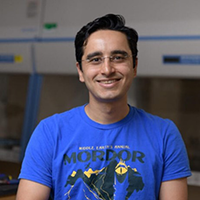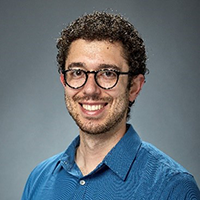Ring In the New Year With Basic Research
Empowering basic biomedical research, which focuses on understanding how living systems work, is one of NIGMS’ main goals. This type of research not only helps us learn how our bodies and those of other organisms function but also lays the foundation for advances in disease diagnosis, treatment, and prevention.
We’re excited to see what the upcoming year has in store for the field! In preparation, we’re highlighting what NIGMS-supported scientists had to say in 2023 about the many merits of basic research. Also check out the links to the Biomedical Beat posts that feature them if you haven’t already.

Q&A With Dylan Burnette: Muscle Cells, Cell Movement, and Microscopy
The unknown and the unasked questions of
cell biology continuously motivate Dylan Burnette, Ph.D., and his research.
Currently, he studies the assembly of the sarcomere, the repeating unit that generates force in muscles.
“Basic biomedical research such as mine focuses on the unanswered questions in biology, which lead to the generation of new, never-before-asked questions, which lead to new ways of thinking and new discoveries that may then lead to disease treatment,” says Dr. Burnette.

Curiosity-Driven Science: Q&A With Saad Bhamla
Saad Bhamla, Ph.D., describes himself as a curiosity-driven scientist. He studies the physics of life around us by asking questions about topics such as how insects pee or how worms blob.
“We do this basic, curiosity-driven science with the hope that it will enable others to see something to build upon and eventually improve lives,” says Dr. Bhamla.
“Without basic science, we can miss the forest for the trees if we just focus on specific applications. We need basic science to be able to innovate in the applied sciences.”

Investigating Bacteria's CRISPR Defense System to Improve Human Health
Ever since Andrew Santiago-Frangos, Ph.D., read a book about germs while home sick one day as a child,
bacteria has fascinated him. Now, he’s increasing our understanding of
CRISPR, a bacterium’s
immune system.
“What fulfills me is making discoveries about how things work at this microscopic scale in biology,
realizing the huge impacts those discoveries can have on our well-being, and then sha

